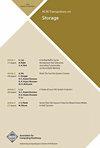Empowering Storage Systems Research with NVMeVirt: A Comprehensive NVMe Device Emulator
IF 2.6
3区 计算机科学
Q3 COMPUTER SCIENCE, HARDWARE & ARCHITECTURE
引用次数: 0
Abstract
There have been drastic changes in the storage device landscape recently. At the center of the diverse storage landscape lies the NVMe interface, which allows high-performance and flexible communication models required by these next-generation device types. However, its hardware-oriented definition and specification are bottlenecking the development and evaluation cycle for new revolutionary storage devices. Furthermore, existing emulators lack the capability to support the advanced storage configurations that are currently in the spotlight. In this paper, we present NVMeVirt, a novel approach to facilitate software-defined NVMe devices. A user can define any NVMe device type with custom features, and NVMeVirt allows it to bridge the gap between the host I/O stack and the virtual NVMe device in software. We demonstrate the advantages and features of NVMeVirt by realizing various storage types and configurations, such as conventional SSDs, low-latency high-bandwidth NVM SSDs, zoned namespace SSDs, and key-value SSDs with the support of PCI peer-to-peer DMA and NVMe-oF target offloading. We also make cases for storage research with NVMeVirt, such as studying the performance characteristics of database engines and extending the NVMe specification for the improved key-value SSD performance.增强存储系统研究与NVMeVirt:一个全面的NVMe设备模拟器
最近,存储设备领域发生了巨大的变化。NVMe接口是各种存储环境的核心,它允许这些下一代设备类型所需的高性能和灵活的通信模型。然而,其面向硬件的定义和规范阻碍了新的革命性存储设备的开发和评估周期。此外,现有仿真器缺乏支持当前备受关注的高级存储配置的能力。在本文中,我们提出了NVMeVirt,一种促进软件定义NVMe设备的新方法。用户可以定义任何具有自定义功能的NVMe设备类型,NVMeVirt允许它在软件中弥合主机I/O堆栈和虚拟NVMe设备之间的差距。我们通过实现各种存储类型和配置,例如传统ssd、低延迟高带宽NVM ssd、分区命名空间ssd和支持PCI对等DMA和NVMe-oF目标卸载的键值ssd,来展示NVMeVirt的优势和特性。我们还对NVMeVirt的存储研究进行了案例分析,例如研究数据库引擎的性能特征,扩展NVMe规范以提高键值SSD的性能。
本文章由计算机程序翻译,如有差异,请以英文原文为准。
求助全文
约1分钟内获得全文
求助全文
来源期刊

ACM Transactions on Storage
COMPUTER SCIENCE, HARDWARE & ARCHITECTURE-COMPUTER SCIENCE, SOFTWARE ENGINEERING
CiteScore
4.20
自引率
5.90%
发文量
33
审稿时长
>12 weeks
期刊介绍:
The ACM Transactions on Storage (TOS) is a new journal with an intent to publish original archival papers in the area of storage and closely related disciplines. Articles that appear in TOS will tend either to present new techniques and concepts or to report novel experiences and experiments with practical systems. Storage is a broad and multidisciplinary area that comprises of network protocols, resource management, data backup, replication, recovery, devices, security, and theory of data coding, densities, and low-power. Potential synergies among these fields are expected to open up new research directions.
 求助内容:
求助内容: 应助结果提醒方式:
应助结果提醒方式:


